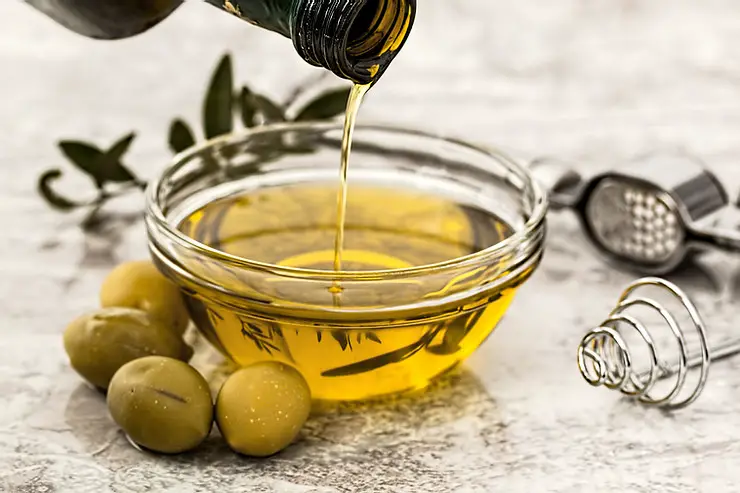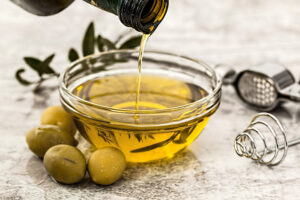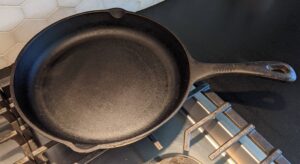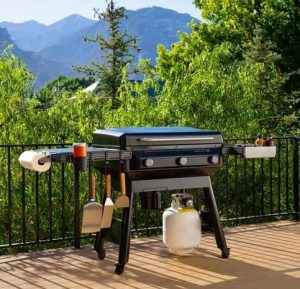When cooking on a flat top grill like a Blackstone, Camp Chef or Pit Boss, cooking oil is a necessity but what is the best oil for griddle cooking? There are dozens of oil options available, so picking the best one to cook with on your griddle can be tricky. Here’s what you need to know about choosing the best oil for Blackstone griddle cooking or any alternate brand of gas griddle.
Table of Contents
What Oil to Use on a Griddle For Cooking
It’s important to know why cooking oil is necessary when cooking on your Blackstone griddle. Even after you have seasoned your Blackstone and built up the non-stick coating, food can still stick to the rolled steel cooktop. To help prevent this, applying a layer of oil to the griddle when cooking reduces the likelihood that food will stick the cooking surface.
Another reason to use oil when cooking on your griddle is that it assists in cooking the food. A light coating of cooking oil transports heat and helps get the texture you want. Additionally, it can add a tasty flavor to your meal.
Last but not least is the protection cooking oil provides to the griddle’s cooktop. When you are finished cooking your meal, you’ll need to clean your griddle properly. Once the griddle surface is clean, the last step is to rub a thin layer of cooking on the cooktop. This layer of oil maintains the griddle’s seasoning and helps prevent issues like griddle rust.
Blackstone Griddle Oil
What are the advantages and disadvantages of various cooking oil options? You should consider several things when deciding what type of oil to use when cooking on your Blackstone griddle. Here’s what you need to know when selecting which cooking oil to cook with on your flat top grill.
Smoke Point
When cooking on a gas griddle, temperatures will get pretty hot, which means you need to be conscious of the smoke point of your cooking oil. Cooking oils cooked above their smoke point can cause the oil to break down, resulting in the release of harmful chemicals, and it can also give the food an undesirable taste.
When choosing an oil, you’ll want to ensure you’re using one with a high enough smoke point. You’ll typically want to use something with a smoke point of at least 400°F and preferably even higher.
It’s wise to avoid using extra virgin olive oil (325°F smoke point) and regular butter (350°F smoke point) unless you’re cooking at lower temperatures. As long as you’re not cranking the heat up too high, these are perfectly fine to use.
I highly recommend getting an infrared thermometer griddle accessory so you can accurately measure the temperature of the griddle when cooking. This helps ensure you’re cooking at the proper heat every time.
Neutral vs. Flavored Oil
Another factor you’ll want to consider when choosing an oil is whether it’s a neutral-flavored oil or not. Neutral cooking oils will not affect the food’s taste, while others will impart additional flavor.
This isn’t necessarily a bad thing, as adding these flavors may enhance the dish you are cooking. It just comes down to what your cooking and what your preference is.
In some foods, you’ll want to impart flavor from the oil into the food. When cooking Asian dishes, sesame oil can impart some fantastic flavor, and many recipes will call for it specifically.
Beef tallow is non-neutral and can also enhance the taste of various dishes if you want the food to stand on its own without the additional flavoring, select a neutral oil that won’t influence the taste.
Below is a quick reference list of oils with at least a 400°F smoke point and whether they are neutral oil or not so you can pick the best option.
| Oil | Smoke Point °F | Smoke Point °C | Neutral |
|---|---|---|---|
| Refined Avocado Oil | 520°F | 270°C | Yes |
| Safflower Oil | 510°F | 265°C | Yes |
| Refined or Light Olive Oil | 465°F | 240°C | Yes |
| Soybean Oil | 450°F | 232°C | Yes |
| Peanut Oil | 450°F | 232°C | Yes |
| Ghee or Clarified Butter | 450°F | 232°C | No |
| Corn Oil | 450°F | 232°C | Yes |
| Refined Coconut Oil | 450°F | 232°C | Yes |
| Refined Sesame Oil | 410°F | 210°C | No |
| Vegetable Oil | 400°F | 204°C | Yes |
| Beef Tallow | 400°F | 204°C | No |
| Canola Oil | 400°F | 204°C | Yes |
Best Oil for Griddle Cooking Final Thoughts
So what’s the best Blackstone griddle oil? Because of its very high smoke point and neutral flavor, avocado oil is the cooking oil I use the most. I don’t have to worry about reaching the smoke point when cooking, and it doesn’t impart any flavor to the meal.
Another go-to option I’ll use is ghee (clarified butter.) This also has a very high smoke point and can add a delicious buttery taste to your food. Butter adds great flavor to dishes, but unfortunately, it has a lower smoke point. Clarified butter, however, has a much higher smoke point making it a great option.
These are my favorites, but there are plenty of viable options, so pick what works best for you and the particular dish you are cooking!
To learn more about cooking on a griddle, visit our education section here on Griddle Sizzle!





